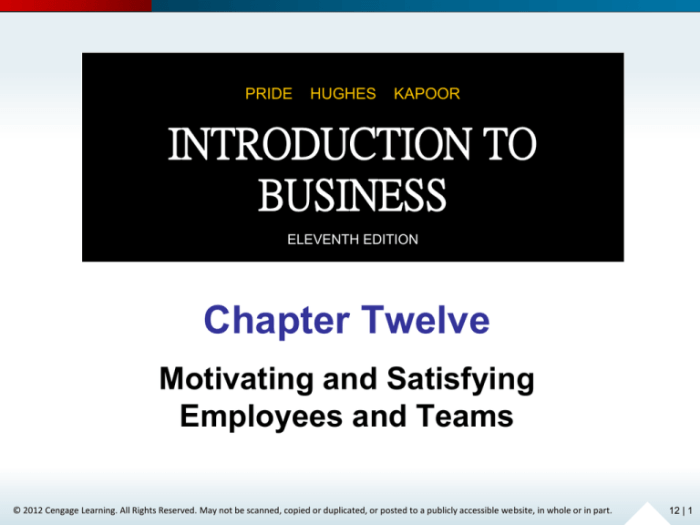Foundations of business 7th edition by pride hughes and kapoor – Foundations of Business, 7th Edition by Pride, Hughes, and Kapoor, offers a comprehensive exploration of the fundamental concepts, principles, and practices that underpin successful business operations. This foundational text provides a thorough understanding of the key elements of business, from foundational concepts and principles to essential functions and strategies.
Delving into the intricate world of business, this book analyzes the external environment, competitive landscape, and ethical responsibilities that shape business decisions. It also examines the role of innovation and technology in driving business growth and competitiveness in a globalized economy.
Key Concepts and Principles
The foundation of business encompasses a wide range of concepts and principles that govern the operation and success of organizations. These include:
Types of Businesses and Structures
- Sole proprietorship: A business owned and operated by a single individual.
- Partnership: A business owned and operated by two or more individuals.
- Corporation: A legal entity separate from its owners, with limited liability for shareholders.
Entrepreneurship
Entrepreneurship refers to the process of creating and managing a new business venture. It involves risk-taking, innovation, and the ability to identify and exploit opportunities.
Principles of Management
- Planning: Setting goals and developing strategies to achieve them.
- Organizing: Structuring the organization and allocating resources.
- Leading: Motivating and directing employees.
- Controlling: Monitoring performance and taking corrective actions.
Marketing Mix
The marketing mix refers to the four key elements that influence consumer behavior:
- Product: The goods or services offered by the business.
- Price: The amount charged for the product or service.
- Promotion: The activities used to communicate the product or service to potential customers.
- Place: The channels through which the product or service is distributed.
Business Environment
The business environment consists of external factors that influence the operation and success of organizations:
External Environment
- Political factors: Government policies and regulations.
- Economic factors: Interest rates, inflation, and economic growth.
- Social factors: Cultural values, demographics, and consumer trends.
- Technological factors: Innovations and technological advancements.
- Legal factors: Laws and regulations governing business activities.
- Environmental factors: Sustainability and environmental regulations.
Competitive Landscape
The competitive landscape refers to the rivalry among businesses in a particular market. Businesses can gain a competitive advantage by:
- Offering unique products or services.
- Differentiation: Creating a distinct image for the business.
- Cost leadership: Achieving lower production costs than competitors.
Ethical and Social Responsibilities
Businesses have ethical and social responsibilities to:
- Act ethically and honestly.
- Protect the environment.
- Contribute to society.
Business Functions
Business functions are the core activities that organizations perform to achieve their goals:
Accounting and Finance
Accounting and finance provide information about the financial health of the organization and manage financial resources.
Operations Management
Operations management involves the production and delivery of goods or services. It includes:
- Process design
- Inventory management
- Quality control
Human Resource Management
Human resource management involves attracting, developing, and retaining employees. It includes:
- Recruitment and selection
- Training and development
- Performance management
Business Strategies

Business strategies are plans that guide the organization’s activities to achieve its goals:
Types of Business Strategies
- Cost leadership: Focus on minimizing costs.
- Differentiation: Focus on creating unique products or services.
- Focus: Targeting a specific market segment.
- Growth: Expanding the business through acquisitions or new markets.
Strategic Planning
Strategic planning involves developing and implementing strategies to achieve the organization’s goals. It includes:
- Stakeholder analysis
- SWOT analysis
- Developing and implementing strategies
Innovation and Technology
Innovation and technology play a crucial role in driving business growth and competitiveness. Businesses can use technology to:
- Improve efficiency
- Create new products and services
- Gain a competitive advantage
Global Business
Global business involves conducting business across national borders:
Challenges and Opportunities
- Cultural differences
- Language barriers
- Economic and political instability
- Opportunities for growth
- Access to new markets
Modes of International Business
- Exporting and importing
- Foreign direct investment
- Licensing and franchising
Cultural Differences
Cultural differences can impact business practices, such as:
- Negotiation styles
- Communication styles
- Business etiquette
Business Communication: Foundations Of Business 7th Edition By Pride Hughes And Kapoor

Effective business communication is essential for success:
Importance of Business Communication, Foundations of business 7th edition by pride hughes and kapoor
- Builds relationships
- Conveys information clearly
- Promotes collaboration
Types of Business Communication
- Written communication: Letters, emails, reports
- Oral communication: Presentations, speeches, meetings
- Nonverbal communication: Body language, facial expressions
Principles of Effective Communication
- Clarity: Use simple and concise language.
- Accuracy: Ensure the information is correct and reliable.
- Completeness: Provide all necessary details.
Business Ethics and Social Responsibility
Businesses have ethical and social responsibilities to stakeholders:
Ethical Issues
- Bribery and corruption
- Environmental pollution
- Discrimination
Corporate Social Responsibility
Corporate social responsibility involves businesses contributing to society through:
- Philanthropy
- Environmental sustainability
- Ethical sourcing
Government Regulation
Government regulation plays a role in promoting ethical behavior and social responsibility by:
- Enforcing laws and regulations
- Providing incentives for ethical behavior
- Holding businesses accountable for their actions
Clarifying Questions
What are the key concepts covered in Foundations of Business?
The book covers foundational concepts such as types of businesses, business structures, entrepreneurship, management principles, and the marketing mix.
How does Foundations of Business address the business environment?
The book analyzes external factors such as political, economic, social, technological, legal, and environmental influences, as well as competitive dynamics and ethical responsibilities.
What business functions are explored in Foundations of Business?
The book examines accounting, finance, operations management, human resource management, and their contributions to organizational effectiveness.